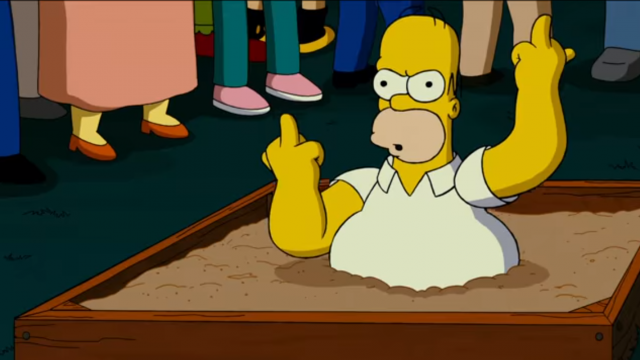The Simpsons Movie is important to me less because of its content and more because of what it represents. If you were to make a list of the things most responsible for the way I talk and write, topping that list would be my primary school principal and The Simpsons. I literally grew up with the series, as it began airing shortly before my birth, and my memory does not go as far back as to when I began watching it. As a result, The Simpsons Movie is the one pop cultural object that makes me feel the passage of time. I have very little patience for people whose reaction to their favourite album or movie or whatever being ten or twenty or fifty years old is ‘oh god I’m so old’, because, like, what did you think was going to happen, you’d be frozen in amber as soon as a song you liked came out? In this case, though, a Simpsons movie is something I spent my whole life waiting for, and realising a decade had passed since something impossible I never thought would come, uh, came was a shock to my system. If human beings are Babushka dolls, with some child version of ourselves hiding in our adult bodies pulling the strings, the child within me will sometimes be reminded that actually, The Simpsons Movie came down a long time ago.
Unfortunately, the passage of time has dulled the film’s effect on me. Outside of Spider-Pig, much of its power comes from scenes and moments that either exaggerate or break your standard Simpsons mythology; the central story of Homer committing sins so large neither the town nor his family can forgive him is an attempt to take the logic of the show to somewhere its never been, the plot point of the dome over Springfield is a clear riff on it being its own world, and there are things ranging from Martin standing up to the bullies for the first time to the largest angry mob scene in the show’s history to the long shot of Bart’s penis, something they could only get away with in a PG-13 movie. These are all things rooted in shock value, something cathartic and incredible the first time and at best tedious with time (except for the angry mob scene). After all these years, only one joke and one story beat have stuck with me; the former is the villain’s line “Have you ever gone mad without power? It’s boring! No one listens to you!” And the latter is this, from the film’s darkest moment:
Marge: Lately, what’s keeping us together is my ability to overlook everything you do. And I overlook these things because…
Homer: Because?
Marge: Well, that’s the thing. I-I just don’t know how to finish that sentence anymore.
That’s a heartbreaking line to me, because so much of my understanding of love is based on forgiving people for being annoying. All people will annoy you eventually, and a loved one is someone who is allowed to annoy you, and the thought of someone eventually breaching an acceptable level of annoying to the point that I’d have to cut them out of my life is a terrifying thought (even after having done that). It’s one of the few moments of shock value that last, because seeing that come from Marge Simpson, with all the emotion it requires (you can hear that it took a hundred takes in Julie Kavner’s voice), is something powerful. Otherwise, the story is made out of beats that were, themselves, beaten into the ground by the show at this point. Lisa’s romance with a boy calls back to, amongst other things, “Trilogy Of Error”; Bart’s newfound relationship with Flanders calls back to “Boy Scoutz N The Hood”. Take away the few big moments, and you have the same mediocrity present in most post-Golden Era Simpsons.

